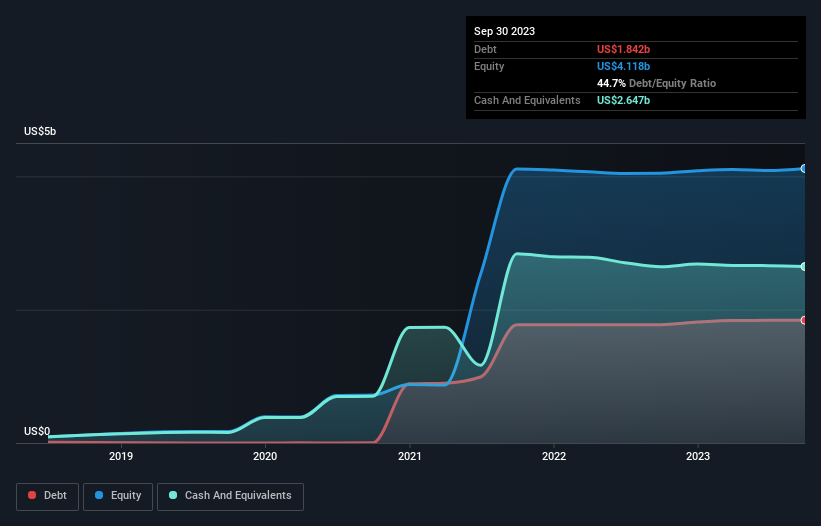- United States
- /
- Software
- /
- NYSE:BILL
Health Check: How Prudently Does BILL Holdings (NYSE:BILL) Use Debt?

David Iben put it well when he said, 'Volatility is not a risk we care about. What we care about is avoiding the permanent loss of capital.' So it seems the smart money knows that debt - which is usually involved in bankruptcies - is a very important factor, when you assess how risky a company is. We can see that BILL Holdings, Inc. (NYSE:BILL) does use debt in its business. But is this debt a concern to shareholders?
What Risk Does Debt Bring?
Debt assists a business until the business has trouble paying it off, either with new capital or with free cash flow. Part and parcel of capitalism is the process of 'creative destruction' where failed businesses are mercilessly liquidated by their bankers. However, a more usual (but still expensive) situation is where a company must dilute shareholders at a cheap share price simply to get debt under control. Having said that, the most common situation is where a company manages its debt reasonably well - and to its own advantage. When we examine debt levels, we first consider both cash and debt levels, together.
View our latest analysis for BILL Holdings
What Is BILL Holdings's Debt?
The chart below, which you can click on for greater detail, shows that BILL Holdings had US$1.84b in debt in September 2023; about the same as the year before. But on the other hand it also has US$2.65b in cash, leading to a US$805.1m net cash position.

How Healthy Is BILL Holdings' Balance Sheet?
The latest balance sheet data shows that BILL Holdings had liabilities of US$3.70b due within a year, and liabilities of US$1.80b falling due after that. On the other hand, it had cash of US$2.65b and US$584.2m worth of receivables due within a year. So it has liabilities totalling US$2.27b more than its cash and near-term receivables, combined.
BILL Holdings has a market capitalization of US$6.75b, so it could very likely raise cash to ameliorate its balance sheet, if the need arose. But it's clear that we should definitely closely examine whether it can manage its debt without dilution. While it does have liabilities worth noting, BILL Holdings also has more cash than debt, so we're pretty confident it can manage its debt safely. When analysing debt levels, the balance sheet is the obvious place to start. But ultimately the future profitability of the business will decide if BILL Holdings can strengthen its balance sheet over time. So if you want to see what the professionals think, you might find this free report on analyst profit forecasts to be interesting.
In the last year BILL Holdings wasn't profitable at an EBIT level, but managed to grow its revenue by 50%, to US$1.1b. With any luck the company will be able to grow its way to profitability.
So How Risky Is BILL Holdings?
While BILL Holdings lost money on an earnings before interest and tax (EBIT) level, it actually generated positive free cash flow US$192m. So although it is loss-making, it doesn't seem to have too much near-term balance sheet risk, keeping in mind the net cash. One positive is that BILL Holdings is growing revenue apace, which makes it easier to sell a growth story and raise capital if need be. But that doesn't change our opinion that the stock is risky. There's no doubt that we learn most about debt from the balance sheet. However, not all investment risk resides within the balance sheet - far from it. We've identified 3 warning signs with BILL Holdings , and understanding them should be part of your investment process.
If, after all that, you're more interested in a fast growing company with a rock-solid balance sheet, then check out our list of net cash growth stocks without delay.
Valuation is complex, but we're here to simplify it.
Discover if BILL Holdings might be undervalued or overvalued with our detailed analysis, featuring fair value estimates, potential risks, dividends, insider trades, and its financial condition.
Access Free AnalysisHave feedback on this article? Concerned about the content? Get in touch with us directly. Alternatively, email editorial-team (at) simplywallst.com.
This article by Simply Wall St is general in nature. We provide commentary based on historical data and analyst forecasts only using an unbiased methodology and our articles are not intended to be financial advice. It does not constitute a recommendation to buy or sell any stock, and does not take account of your objectives, or your financial situation. We aim to bring you long-term focused analysis driven by fundamental data. Note that our analysis may not factor in the latest price-sensitive company announcements or qualitative material. Simply Wall St has no position in any stocks mentioned.
About NYSE:BILL
BILL Holdings
Provides financial operations platform for small and midsize businesses worldwide.
Mediocre balance sheet low.
Similar Companies
Market Insights
Community Narratives


